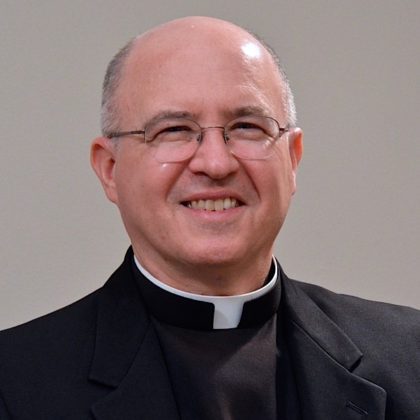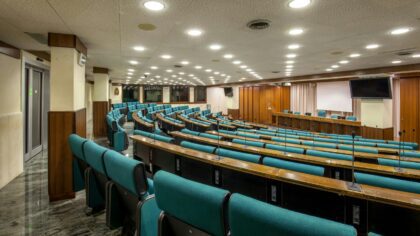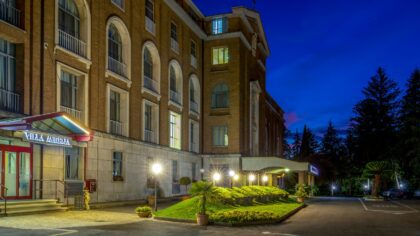The following was written on March 18, 2020, by Fr. Stephen Huffstetter, SCJ, our vicar general and former provincial superior of the US Province:
Dear Dehonian friends,
Greetings from Rome!

So many people have written to me these past few weeks because they’ve seen Italy mentioned so often in the news as Ground Zero for the COVID-19 virus outbreak in Europe. “Are you OK? What is it like?”
Rome is a much different city than I have ever experienced it. First, we noticed the lack of tourists and crowds. Two weeks ago, I went to St. Peter’s Basilica to begin Lent by going to confession. The usual wait is about 45 minutes to an hour. I walked up to the security line with only three people ahead of me. Inside, only a few people were scattered about the massive church. Instead of a throng ten deep by Michelangelo’s Pieta, there was a one small group. I walked up to the altar area and enjoyed the sculpture, statues, and art nearly in silence and with much tranquility. So prayerful!
In those first days, the lines at the grocery stores were longer than the lines at the historic attractions. However, Romans did not go crazy with hoarding like we’ve heard in other places. Romani rely much more on smaller, local grocery stores they can walk to, and many people buy fresh fruit, bread and vegetables daily. Plenty of toilet paper remained on the shelf. The one item you cannot find is masks. Instead of prices shooting up, with restaurant customers dwindling, the large supply of fresh produce caused those prices to fall dramatically.
I left town for a week’s pastoral visit to our Dehonians in Belgium and the Netherlands. During those days, I read about increasing numbers of sick and dying, as well as the more drastic measures being taken by the day. Alitalia sent me notice that my flight home was canceled, but they could still put me on a later flight.
I arrived in Rome at 8:30 Friday night with maybe 50 other people on a plane built for 250. I glanced at the arrival board and on the first screen I saw that 27 of 28 departures from Rome had been canceled. Health authorities scanned us for fever before they let us through to collect our luggage.
I had no problem getting a cab. There was no one else in line. The driver assigned to work the airport that night told me I was his first customer in six hours! The streets were nearly deserted and we reached the Generalate in record time.

I received a list of changes in the house routine. The chapel has a two per pew limit, and in the refectory [dining room] tables built for eight to ten have a maximum seating limit of four. Since I am coming back from travel, I will eat in a separate dining room with only one other confrere for the next two weeks. The members of our kitchen staff are still able to come to work, but we now have strict orders to stay out of the kitchen completely, not even to help bring in the dirty dishes.
Like most hotels in Rome, our Villa Aurelia is closed due to all the cancellations. Most of the area restaurants are not franchises, but family owned and many are worried the shutdown will ruin them.
Classes at the Pontifical Universities have been canceled, or gone online. Our student priests have plenty of time to read and study. You now must have a form with your ID information and a specific, necessary reason for leaving your house. There are fines for wandering about without one. We are reminded to think of the elderly, and make a sacrifice of our convenience now to prevent the spread of the disease and increased suffering.
Fr. Stefan, the director of the Center for Dehonian Studies, has faithfully gone into the historic city center one night a week for several years with the community of San Egidio, offering a sandwich and conversation to the senza-tetta (without a roof, or homeless) of the city. During the epidemic they are some of the most vulnerable of the population. While he must take extra precautions, like wearing a mask and handing out individually wrapped sandwiches, he offers this needed service.
Pope Francis still goes to his balcony for the Sunday Angelus, but St. Peter’s Square is closed and you can only see him on TV. Holy Week services at St. Peter’s will be held without the participation of the public. There are no Sunday masses in Rome. Yet Pope Francis asked pastors to keep the neighborhood churches open so people can stop in for a quick prayer, much needed in this time of worry and struggle.

The grocery stores and drug stores are open. There are often lines, with a healthy distance between people, and only a few people at a time are allowed into the store. When I walked in, they handed me disposable plastic gloves to use for the items I needed.
The large and scenic park near our house would be great therapy but it too has locked its gates. When school was let out, throngs of youngsters began to hang out in the parks, and officials want them to stay home and away from groups. We are fortunate to have spacious grounds around our property. We don’t hear many cars, horns and sirens any more, but more chirping of birds and the wind rustling through the trees.
Around 6 pm in our neighborhood, I hear opera music blaring from one of the nearby condominiums. Italians are a social people, and many come out on their balconies to listen, wave to neighbors, and try to spread a bit of cheer.
Our Superior General, Fr. Carlos, is grounded in Spain. Fr. Vincent will be in his home country of Indonesia until Rome begins allowing travel from Asia. We will have our next series of General Council meetings by teleconference. The next two months of a full and busy calendar has been completely erased and we have to start anew.
None of us knows how long this will last, or what lasting changes it will bring to our world. That doesn’t change our basic charism, but calls us in a deeper way to seek out God’s will each day, and respond with love and a spirit of oblation.
Prayers for each of you and the hardships you may be facing.
Fr. Stephen Huffstetter, SCJ



